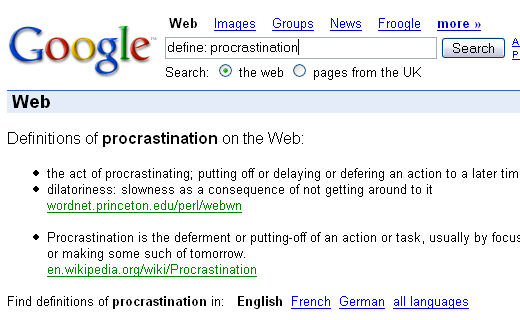A natural step in my personal development and self-improvement is concentrating on the things that really matter to me, and reclaiming the time I currently spend on things which are not important at all. I mean, wouldn’t it be so much better to spend your time on things you like, enjoy a company of your family, or simply bring more value to others, instead of wasting precious time doing things which are much less important to you? This article will show you my approach to increasing my productivity and reclaiming my spare time.
Find out what activities require a regular commitment
This is the first step towards reclaiming your time. You’ve got to find out what is it that you’re required to do on a regular basis. Some things, you will be surprised enough to find out, are not required to be done at all, yet you’re following a habitual pattern and do them anyway.
Like with so many things, the Pareto Principle can be applied to finding the time parasites as I call them. In context of the search for things which regularly take up your time, you will most likely realise that 20% of your tasks would be consuming (wasting, if you take a closer look at some of them) 80% of your time. This means that if you find only a few of the major offenders, you’ll be able to reclaim a substantial amount of your time by changing very little – like consciously fighting one of your bad habits, etc.
For example, I haven’t been entirely happy about my e-mail processing habits. Not only have I got a habit of replying to almost every e-mail very quickly, but I’ve also gotten into the terrible pattern of checking my e-mail almost every 10 minutes. A quick research has shown that I’m by no means alone with such e-mail problems – Dave Lorenzo has recently been reporting his progress in fighting e-mail patterns in his Making The Most Out of E-mail article.
Now, it doesn’t really take you this long to check your e-mail, it could be done in just a few seconds. But the real damage is done not through wasting my time, but through distraction from other activities. If I’m working on some task, like writing a document or reading through some technical manual, or simply working on some problem, it is best solved with my full attention.
And every now and then there are these moments when it’s slightly harder to maintain your focus – I could be stuck with a problem not seeing what to do next, or I could be taking some time to analyze the command output I’m seeing on the screen – it could be anything, really. But during these moments it’s very easy to get distracted, cause you’re in some kind of suspended mode – not very focused at all. It is during these moment that you can be tempted to switch the task and do something else “for a change”. Now, please don’t mix these moments of weakness with powerful and conscious multitasking – it’s very different.
Now, what happens is that I start checking my e-mail, and even if there’s nothing new there, I’m still going to be distracted enough that it’s going to take me some time to fully focus on the original task again. And that’s the real damage I’m talking about.
Make a decision to reclaim your time
Once you’ve come up with the list of things you think are taking too much of your time, it’s time to build a strategy. You need to make a decision to stop spending more than a certain amount of your time for a certain activity. If you want to make it easier, write your decision down somewhere – when written, it automatically becomes a very powerful commitment, and it will help you stay conscious and focused when fighting your habits or behavioural patterns.
In my case, I’ve decided to change my e-mail patterns completely. Instead of constantly checking my various e-mail boxes, I’m now checking my e-mail only few times during a day, and plan e-mail-related activities to happen during the designated periods of time only. I’ve made a decision to do so, and I’m documenting all my attempts to break the old pattern and adopt a new.
Generally, you want to find as many ways to optimize your time, as possible. One great idea I’ve got from Peter Kua in his Triple Your Free Time article, for instance, is that you have to make free time a goal, and plan for it!
Sometimes this will involve giving bad habits up, in other cases this will be a radical change in your approach to a certain task, and obviously this will require more discipline from you. Steve Pavlina did a great job sharing his thoughts on this in his Do It Now article, which I consider to be one of his most influential posts.
Stick to the plan. Enjoy your results!
It’s been a couple days for me fighting my e-mail patterns, and I must say I’m thrilled with both the general feelings and the results I have. It wasn’t hard at all to wait for the agreed times of the day to read and write e-mails. Once you have a plan, it’s easier to see that it’s not really so hard to follow through.
Secondly, it was great to see that nothing critical went wrong because I’ve changed the pattern. This confirmed that my plan was reasonable, and reassured me of the positive change I’m fighting for.
What’s left now is to make sure I stick to the plan and confirm the new pattern to be the only way of processing e-mails. Once I’ve done this, in just few weeks times, I’ll be able to move onto a next time consuming task to optimize or even get rid of.
I encourage you try the same: reclaim your time now, and you’ll be amazed how easy it is!

